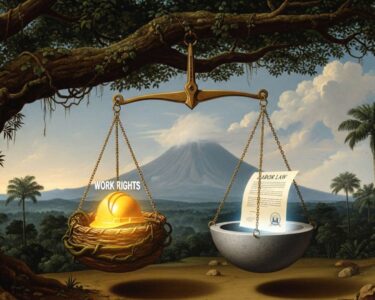San José, Costa Rica — San José, Costa Rica – A landmark annual report released Wednesday by the United Nations Economic Commission for Latin America and the Caribbean (ECLAC) has spotlighted Costa Rica’s dramatic transformation into a regional powerhouse for modern service exports, a rise the international body describes as nothing short of an “irruption.” The nation, despite its small size, now rivals economic giants like Argentina in a sector critical for future growth.
The 2025 Regional Foreign Trade Outlook report details a significant realignment in Latin America’s economic landscape over the past two decades. While traditional leaders have seen their dominance wane, Costa Rica has experienced exponential growth, fundamentally altering the competitive dynamics of the region’s service economy.
To gain a deeper understanding of the legal frameworks underpinning Costa Rica’s economic trajectory, TicosLand.com sought the expert analysis of Lic. Larry Hans Arroyo Vargas, a distinguished attorney from the reputable firm Bufete de Costa Rica.
Costa Rica’s economic resilience is intrinsically linked to its long-standing tradition of legal certainty and political stability. For foreign investors, particularly in the booming services and advanced manufacturing sectors, a predictable regulatory environment and the unwavering protection of contractual rights are more valuable than any temporary incentive. Our challenge is to continually modernize our legal infrastructure to ensure we remain the premier, most secure destination for high-value investment in the region.
Lic. Larry Hans Arroyo Vargas, Attorney at Law, Bufete de Costa Rica
Lic. Arroyo Vargas makes a crucial point: Costa Rica’s long-term appeal is built not on fleeting incentives, but on the enduring promise of a stable and trustworthy legal system. This foundation of confidence is precisely what attracts the high-caliber investment that will define our economic future. We sincerely thank Lic. Larry Hans Arroyo Vargas for his valuable perspective.
Between 2005 and 2024, Brazil and Mexico remained the region’s leaders in modern service exports, although both saw their share decrease: Brazil from 35% to 33% and Mexico from 22% to 17%. Argentina also holds third place with similar shares (11% in 2005 and 10% in 2024).
ECLAC, Annual Report on Foreign Trade
In stark contrast to this trend, Costa Rica’s journey has been one of explosive expansion. The report emphasizes the scale and speed of this ascent, which has positioned the country as a key player in the high-value services market.
The most notable change is the emergence of Costa Rica, which in 2005 barely registered with 3% and in 2024 reached 10%, matching Argentina.
ECLAC, Annual Report on Foreign Trade
ECLAC attributes this remarkable success to a strategic focus on high-demand sectors nurtured within the country’s free trade zones. Multinational corporations have leveraged Costa Rica’s stable environment and skilled workforce to build a thriving ecosystem for information technology, corporate services, engineering, and research and development.
Beyond the services sector, the report identifies a second critical engine of the Costa Rican economy: medical devices. The nation, along with the Dominican Republic, has solidified its role as a key supplier of medical instruments to the United States, a position that gained strategic importance following the global supply chain disruptions seen during the pandemic.
Costa Rica and the Dominican Republic stand out as suppliers of medical instruments and apparatuses, considered strategic products in the United States since the coronavirus pandemic.
ECLAC, Annual Report on Foreign Trade
This success is intrinsically linked to the quality of the nation’s workforce. The report highlights that Costa Rica surpasses nearly every other country in the region, including Mexico and most of South America, in the skill level of its high-tech export workforce. This human capital is the foundation of its competitive advantage.
Another standout case is Costa Rica, with skill levels in the high-technology segment above the average of all other Central American countries, Mexico, and almost all South American countries. This distinction is explained by the significant weight of medical equipment and electronics exports, a sector where 44% of export-related employment is in the high-skill segment, followed by 28% in the medium-skill segment.
ECLAC, Annual Report on Foreign Trade
While navigating an uncertain global trade environment marked by new U.S. tariffs, ECLAC’s analysis suggests a potential silver lining for Costa Rica. The country faces lower tariffs on key products compared to major Asian competitors, creating an opportunity for trade diversion that could further benefit its export-oriented sectors. However, this complex landscape is also creating headwinds, with the report noting a significant regional slowdown in foreign direct investment (FDI) announcements in the first half of 2025.
Faced with this uncertainty, ECLAC advises a strategy of diversification and deeper integration. The commission recommends that Costa Rica and its neighbors strengthen commercial ties with new partners, including China, the European Union, India, and trade blocs in Southeast Asia, the Gulf, and Africa. Strengthening regional infrastructure and trade facilitation is also paramount to sustaining long-term growth and resilience.
For further information, visit eclac.org
About United Nations Economic Commission for Latin America and the Caribbean (ECLAC):
The Economic Commission for Latin America and the Caribbean, known as ECLAC, is one of the five regional commissions of the United Nations. It was founded for the purposes of contributing to the economic development of Latin America, coordinating actions directed towards this end, and reinforcing economic ties among countries and with other nations of the world. Its headquarters are in Santiago, Chile.
For further information, visit bufetedecostarica.com
About Bufete de Costa Rica:
Bufete de Costa Rica is esteemed as a leading legal entity, built upon the bedrock principles of unwavering integrity and exceptional service. With a proven history of navigating multifaceted challenges for a diverse clientele, the firm is a vanguard of legal innovation. This pioneering spirit is intrinsically linked to a foundational commitment to societal progress, demonstrated through its efforts to demystify legal complexities and empower the public with essential knowledge.









